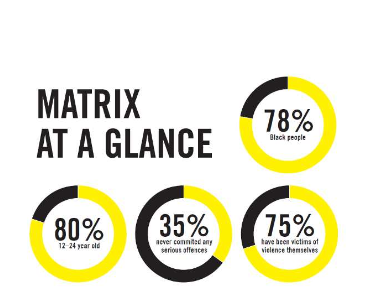The Metropolitan Police have removed the names of one thousand young black men from a controversial database of gang members, almost a third of the database. The Gangs Matrix consists of the names and details of people that the Met perceive to be in a gang and likely to commit violence. The majority of the names removed were in what is called the ‘Green Banding’, meaning that they were found to have very low rates of offending and victimisation levels, if any at all, in the year before and after removal.
The Gangs Matrix was created in secret as a response to the 2011 riots, which the Metropolitan police initially blamed on gangs. It was quickly criticised for disproportionately overrepresenting young black males. In 2018, reports published by Amnesty International and StopWatch found that over a third of those on the database (35%) had never been convicted of a serious offence whilst three-quarters were actually victims of violence themselves (here).
The Information Commissioner’s Office (ICO), meanwhile, found in their own 2018 investigation that the force’s use of Matrix led to a multitude of serious breaches of data protection legislation, creating concerns as to how the data was being shared. The London mayor Sadiq Khan’s own review, meanwhile, found that names were sometimes kept on the database because of out-of-date information – and sometimes without much relevant supporting evidence at all. Being on the Matrix can lead to people being singled out for stop and searches as well as having issues with housing applications and in jobs (here).
‘We welcome the efforts made by both the Met Police and Mayor of London to reform the Gangs Matrix, but we still have very serious concerns around racial bias and data sharing,’ commented Oliver Feeley-Sprague, Amnesty International UK’s policing expert. ‘The Met itself acknowledges that the Matrix is still racially biased towards young black men who continue to make up too much of the Matrix cohort. The proportion has decreased, but only slightly, having gone down from 90-80%.’
‘It’s obviously welcome that more than 1,000 people with a ‘green’ or ‘zero harm’ score have been removed from the Matrix, but it’s tremendously worrying that they were ever included in the first place,’ he continued. ‘The analysis of their low levels of re-offending following removal suggests it was always a serious error to include them on any sort of violence-related database. There’s still no clarity on the nature or accuracy of the ‘intelligence’ that leads to people being put on the Matrix. Are police officers making highly subjective decisions based on a person’s Facebook postings or what they might view on YouTube?’
Amnesty remains concerned about data-sharing risks and is calling for clarity on who has access to the database ‘and whether it still includes people in charge of housing, education and immigration services, which could continue to be problematic’. ‘The Matrix still has many of the hallmarks of a seriously flawed and discriminatory policing tool used to unfairly target young black men – something that can only lead to greater mistrust of the police among affected communities,’ Feeley-Sprague added.
Neal Brown of StopWatch, called the move ‘a small but positive step towards addressing the discriminatory surveillance of mainly young Black men under the pretence of dealing with gang crime, but of course, more needs to be done’. ‘In the spirit of transparency on this issue, we believe that the families of those individuals unfortunate enough to find themselves on the database deserve an explanation for how they came to be on there if they did not, in fact, belong on it in the first place,’ Brown said. ‘Furthermore, the removal replicates the secrecy and lack of transparency that has dogged the Matrix and raises questions about how many people are still on it that shouldn’t be. We would hope that the Met can use this moment to better understand how the wrongful, repeated targeting of people who are clearly innocent of the suspicion directed towards them is unacceptable and should never happen.’







